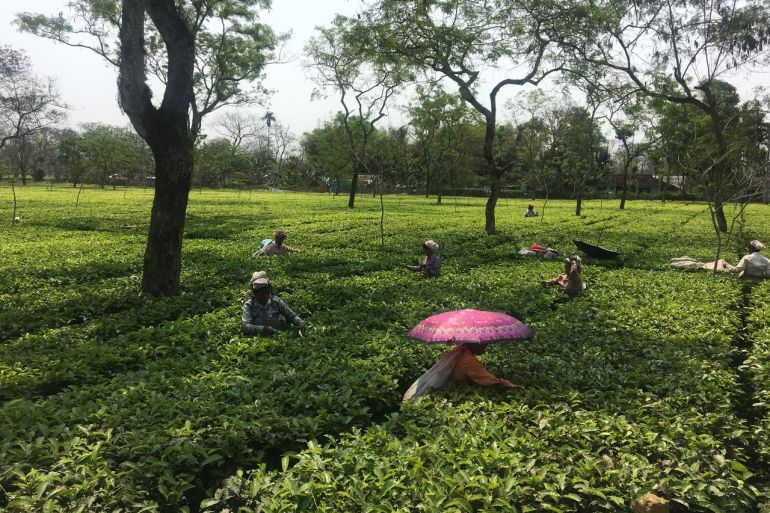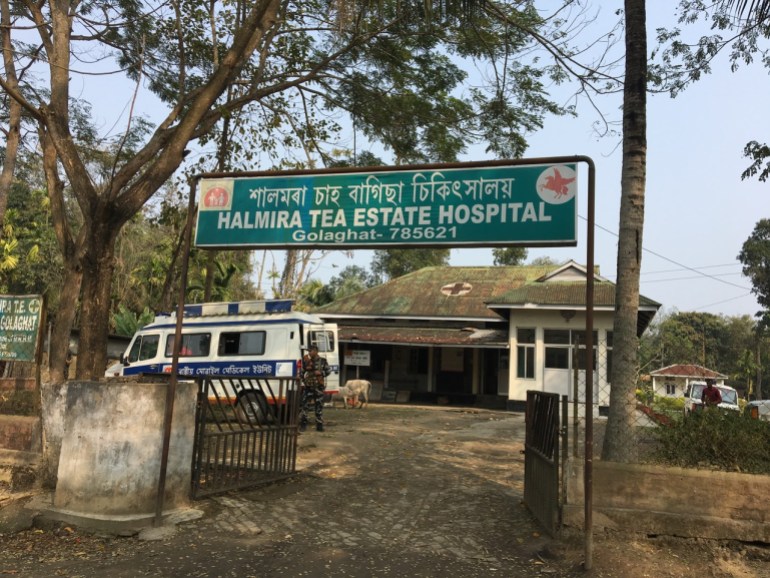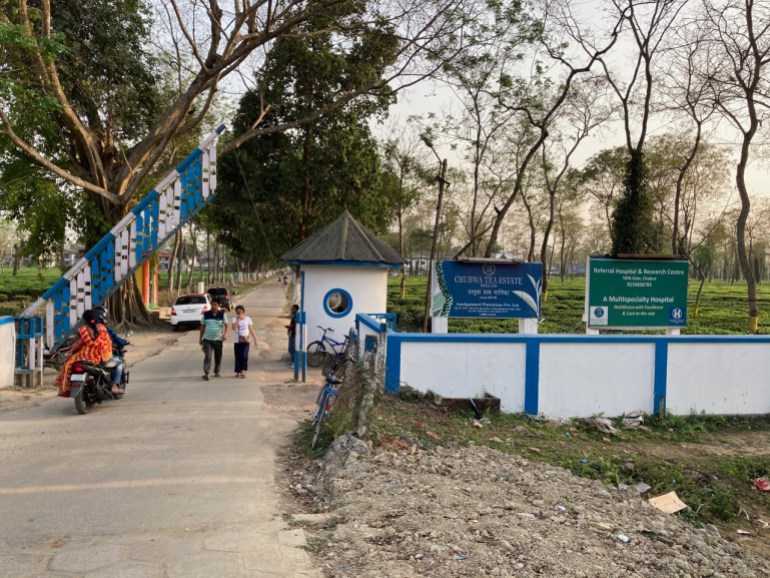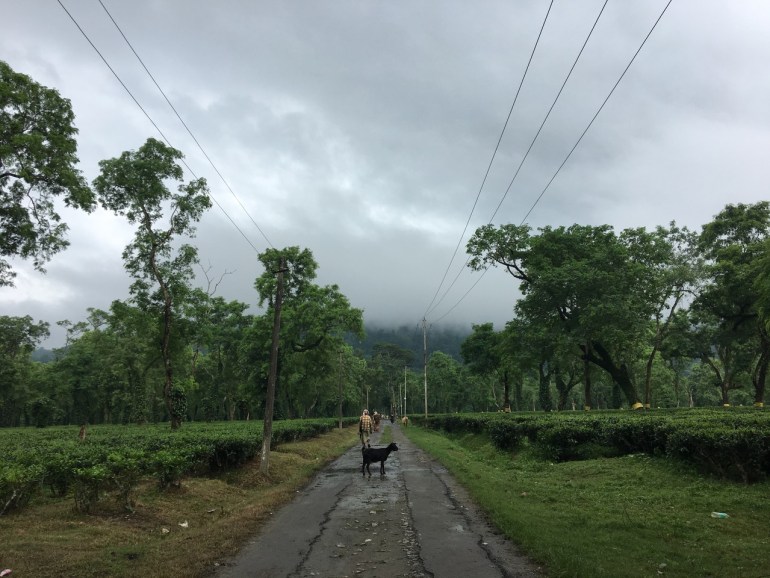Tea garden workers in India’s Assam hit by second wave of COVID
More than 7,000 cases spread across the state’s 403 out of 800 large tea gardens since April, while at least 53 people have died.

Guwahati, Assam, India – Gautam Sabar had been complaining of fever and headache for a week so on May 15, his son Gaurab Sabar took him to the in-house hospital at the Dimakuchi tea estate in northeast India’s Assam state.
There was no doctor to attend to him and the health assistant present at the facility prescribed him some medicine and let him go, Gaurab told Al Jazeera.
Keep reading
list of 4 itemsIndia’s economy showed momentum in Q1 prior to COVID surge
COVID-19: India promises 120 million vaccine doses for June
As COVID overwhelms India’s hospitals, housing societies step in
The next morning, as Gautam’s condition deteriorated, the son rushed him to the health facility again. This time the assistant put him in the tea garden’s ambulance and sent him to a government facility 20 kilometres (12 miles) away where he tested positive for COVID-19.
Not equipped to tackle serious cases, the doctors at this facility asked them to take Gautam to the Civil Hospital at Udalguri, the district headquarters.
Soon after he arrived at the hospital, Gautam, who had a history of diabetes, died.

Dimakuchi Tea Estate where Gautam worked has seen 34 positive cases and two deaths since a vicious second wave of the coronavirus hit India in early April.
Hundreds of workers are reporting sick in Assam’s tea gardens amid an abysmally low rate of vaccination as the state government battles to contain the spread of the virus.
According to figures maintained by Assam’s Labour and Welfare Department, there have been 7,121 COVID-19 cases spread across the state’s 403 out of 800 large tea gardens since April. As many as 53 people have died.
Assam was one of the five states that held a regional election in March and April even as signs that the pandemic was making a comeback were visible in several pockets of India.
As cases started surging in Assam, the authorities announced restrictions in mid-April. On May 11, the state government announced the shutting down of offices in urban and semi-urban areas.
But tea gardens are operational and about a million tea workers continue to go out and work for 205 Indian rupees (less than $3) a day in Brahmaputra Valley and 183 rupees ($2.50) in Barak Valley, after the recent wage hike of 38 rupees (50 cents).
The month of May is picking time for the second flush of tea which would make its way mostly to the international markets. Assam produces more than half of India’s tea.
The industry is already facing a loss of production due to the lockdown in 2020 and a partial drought in early 2021.
“As of today, we have already lost 60 million kilos (132 million pounds) in comparison to 2019 production because of low rainfall. Between January and May 2020, the production was 78 million kilos (171 million pounds) less than the figure in 2019,” Bidyananda Barkakoty, an adviser to the North Eastern Tea Association told Al Jazeera.
He added that it was “safer for the workers to come to work than stay home”.

The virus can spread just as easily in the housing quarters. The workers come back home to families sharing a cramped one-room accommodation, often without proper ventilation, sanitation or clean drinking water.
Several studies have noted a high rate of malnutrition, anaemia, hypertension and tuberculosis among tea workers brought in from other states in central and eastern India by the British rulers in the 19th century. These workers now comprise 17 percent of the state’s population.
To contain the spread of the virus, the government banned home isolation in tea garden areas and ordered the establishment of COVID-19 care centres with the state’s help.
“We are not allowing home quarantine for anybody who is testing positive in the tea garden areas,” said Sanjoy Kishan, Assam’s minister for Welfare of Tea Tribes, Labour and Employment.
Kishan said the government has ordered the setting up of such COVID-19 care centres in all tea gardens. Symptomatic and severe cases were being referred to government health facilities and hospitals, he added.
As per records reviewed by Al Jazeera, there are around 288 COVID-19 care centres currently functional in tea gardens across Assam.
Barkakoty said the measure has helped to contain the spread. But the number of cases in tea garden areas continues to see a spike, growing by 385 percent in the last 12 days even as the surge has slowed down in Assam.
The bulk of the cases and 43 of the 53 deaths have been reported from five districts of Tinsukia, Dibrugarh, Golaghat, Charaideo and Jorhat in the lush tea belt of Upper Assam, where critical healthcare facilities are nearly full, according to multiple officials at the hospitals.

Even as officials claim they are ramping up testing for early detection of the infections, there have been instances of people dying before they could be tested.
At Hapjan Tea Estate in Tinsukia, 55-year-old Pradhan Murah, who lived with his son in the workers’ quarters died on May 20, two days after he complained of fever, cough and chest pain.
Minu Sawashi, a local health worker at the tea estate who had been visiting Murah while he was sick, summoned a testing team. “COVID-19 was detected in his dead body,” Sawashi told Al Jazeera.
Dhiraj Gowala, the president of All Assam Tea Tribes Student Association, a student body representing the tea workers, said the spread of the infection is fast in tea garden areas.
“They are densely populated,” he said. “The government needs to increase testing and vaccination.”
As of May 31, only 46,874 people had got the first dose of the coronavirus vaccine and 3,604 were fully vaccinated in the tea garden areas, according to the government records.
Community leaders claim that a mix of hesitancy, lack of access to vaccination centres and technology has slowed down the vaccination drive.
“Nobody in the tea gardens understands the online process. Many do not have phones,” said Karuna Kanta Kairi, a tea worker from Charaideo district, referring to the compulsory requirement of online booking of a slot for vaccination for people in the 18-44 age bracket.
“People from the tea gardens cannot go out. They should vaccinate them here,” said Gowala.
As criticism grew, the government started vaccination camps in about 299 tea gardens and allowed walk-in registrations for those in the 18-44 age bracket.
Kishan said committees comprising of district authorities, tea garden management and community organisations have been set up to educate the tea workers about the urgent need for testing and vaccination.
But a shortage of vaccines has come in the way of these efforts.
“There is a shortage of vaccines not just for the tea gardens, but for the whole community,” a health department official in Tinsukia told Al Jazeera on condition of anonymity.
“We are trying to arrange for the vaccines. There is a slight problem with supply. But the chief minister has assured us that vaccines will be provided,” he said.